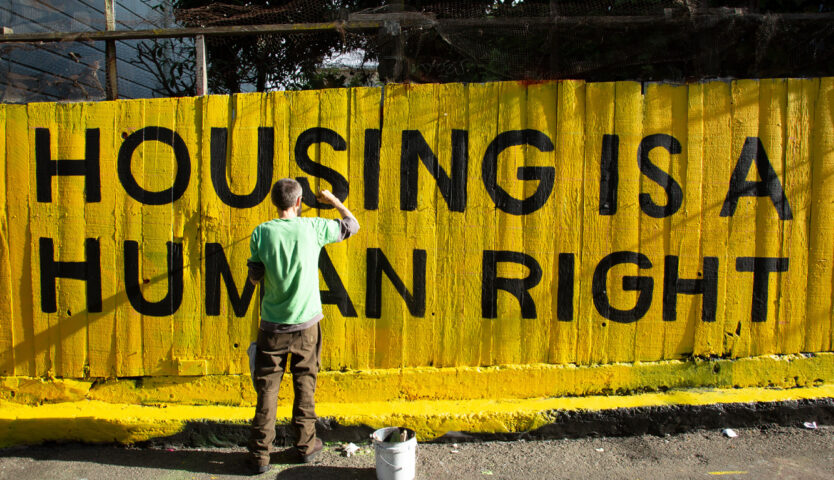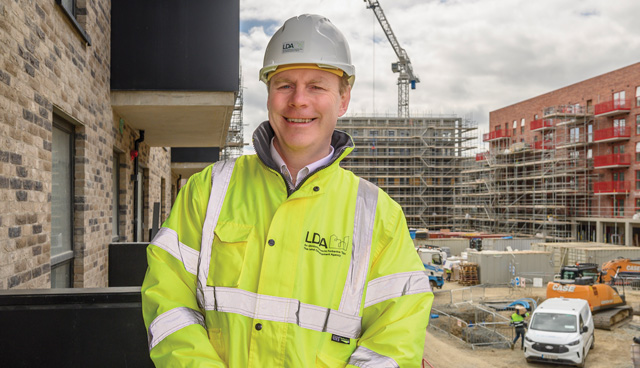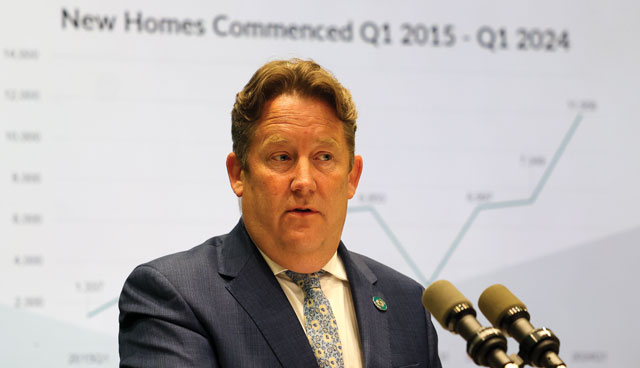
Grant’s integrated heating solutions delivering efficiency to residential projects throughout Ireland
3rd July 2024
Coillte: Promoting wood as the sustainable building material of the future
3rd July 2024Housing Commission split on right to housing referendum

The Minister for Housing, Local Government and Housing published The Housing Commission’s referendum report calling for the State to guarantee a right of access to adequate housing “as far as practicable”. Owing to fundamental disagreement, the Minister simultaneously published the minority report prepared by dissenting commissioners, which argues that the Constitution already allows government to take the necessary measures on the housing crisis.
In Proposed Wording for an Amendment to Bunreacht na hÉireann/Constitution of Ireland, The Housing Commission recommends the creation of a proposed article 40A of Bunreacht na hÉireann, which would stipulate:
1°: The State recognises that having a home is of fundamental importance to quality of life and that access to adequate housing, by facilitating the development of family, social and community relationships, promotes the common good.
2°: The State therefore guarantees to every citizen a right of access to adequate housing and pledges, as far as practicable, by its laws to protect and vindicate that right.
The commission rationalises that a constitutional amendment could perform three functions:
- clarify the legal and constitutional position that the State is entitled to regulate private property rights in the interests of the common good, including in the interests of ensuring access to adequate housing;
- affirm and recognise the importance of housing to the dignity of individuals and its connection to the enjoyment of a range of personal rights under the Constitution; and
- place an obligation on the State to take measures in relation to the provision of housing in particular circumstances.
Minority report
Several dissenters within The Housing Commission disagreed with the need for a constitutional amendment, arguing: “No constitutional barrier exists to the government taking the steps needed to address the housing crisis.”
In that context, the Minority Report on Proposed Wording for an Amendment to Bunreacht na hÉireann asserts that an amendment based on the premise of a “pervasive perception” of there being some constitutional impediment to developing an effective housing policy would be “not only unnecessary but also unwise”.
“Promoting a constitutional amendment on the basis of nothing more than perception would very likely entail unintended consequences.
The minority report further argues that the official report does not sufficiently substantiate the conclusion that an amendment to the Constitution is necessary to clarify the law and that an amendment is not necessary to clarify for future generations, the State’s commitment to housing.
The minority report further says that there are “alternative measures that should be pursued in preference to amendment of the Constitution”.
During its period of work, The Housing Commission was tasked with independently advising the Government on critical factors for consideration. One such critical factor is the ability of the State to meet any guarantee it provides to its citizens in the Constitution. The minority report analyses that a significant gap currently exists between housing required by society and the existing stock, a deficit that will take years to address.
In that period, the minority report argues that, regardless of any wording in the Constitution and despite best intentions, “the State simply cannot guarantee to every citizen that they can access adequate housing”.
“Including in the Constitution an individual right that guarantees to every citizen a right of access to housing will unfairly create a false expectation.”
The circumstances determining access to housing generally are complex, the minority report argues that “legislation can better consider all potential stakeholders and those impacted in relation to any proposed changes and can address the needs and concerns of all in detail and with greater certainty”.
“The manner and quantum of the application of State resources, and the decision as to how those resources are to be apportioned in meeting social and economic policy goals, is and should remain the domain of the democratically elected Government. Review by the Courts can be introduced, to ensure implementation,” the report says.
In the event that a referendum is held on a constitutional amendment relating to housing, the minority report proposes the insertion of the following text into Article 45, at its conclusion: “5 i. The State shall direct its social policy towards ensuring adequate affordable housing for every citizen, as part of a national housing policy that meets the needs of its citizens. ii. In furtherance of such obligation, the State shall take legislative and other measures, within its available resources, to achieve the progressive implementation of such a housing policy. iii. Notwithstanding the provisions of the preamble to this Article, compliance with the requirements of paragraphs 5(i) and 5(ii) shall be cognisable by the Courts established by Article 34 of this Constitution.”
Constitutional considerations
Bunreacht na hÉireann is the fundamental law of Ireland. It establishes the branches or organs of government and the courts and sets out how those institutions should run. It also describes the fundamental rights of every Irish citizen.
In developing a potential wording for a referendum on housing, therefore, the overall wording and structure of the Constitution was considered by the Housing Commission. As well, articles were analysed during the Commission’s deliberations on the appropriate placement of the proposed amendment. Particular attention was given to Articles 40, 43 and 45.
The following articles were examined:
- Article 40, in which fundamental rights are set out;
- Article 43, in which the property rights of every citizen are set out (as well as in Article 40.3.2); and
- Article 45, which lays down Directive Principles of Social Policy that are addressed to the Oireachtas.
In putting together its official report, the Housing Commission received submissions from organisations in favour of a referendum on housing. The Commission received submissions from organisations, including community and voluntary groups, housing bodies, charities, trade unions, nongovernmental organisations, political parties, and research institutions.
From these submissions from key stakeholders, the official report states that common themes can be extrapolated from the submissions received, a synopsis of which is provided below:
- Many of the submissions argued that the introduction of a constitutional right to housing would compel the State to take a greater role in the direct provision of adequate and affordable housing.
- Many of the submissions argued that a constitutional right to housing would tackle the perceived imbalance that exists within the Constitution.
- The official report states that several submissions noted that the Government had claimed to be constrained in its ability to respond to the housing crisis because of the Constitution. While noting that it is arguable whether such an attitude would be reflected by the courts, the submissions argued that, in practice, a referendum is necessary to remove such perceived barriers to legislative action in relation to housing.
Programme for Government
The 2020 Programme for Government does not contain a commitment to a constitutional right to housing. Instead, it states: “We believe that everybody should have access to good-quality housing to purchase or rent at an affordable price, built to a high standard, and located close to essential services, offering a high quality of life.
“We understand that the provision of more affordable housing has a profound benefit socially and economically and believe that the State has a fundamental role in enabling the delivery of new homes and ensuring that best use is made of existing stock.”
The Housing Minister received the majority report on the proposed wording of a referendum on housing from The Housing Commission in July 2023 and the minority report in November 2023.
Speaking with the Housing Ireland Magazine, Minister summarises his rationale for waiting to publish them alongside the Report of The Housing Commission: “It was a preference.”
Asked if there would be a housing referendum in the lifetime of this government, the Minister responds: “In fairness, the joint Oireachtas committee will have a role in that. I have got to go to cabinet… Any referenda have to be prepared properly and have to be understood.
“It was always something that I have wanted to advance but it has to be advanced properly. I am not overly concerned if it is in the next few months or if the next government that does it – it is definitely something that needs to be considered properly and how do you vindicate what is in the Constitution. That is the most important thing.
“I think it will be for the next government but at least now, the work has been done to be considered so that any government will now have a template to move forward with it.”







